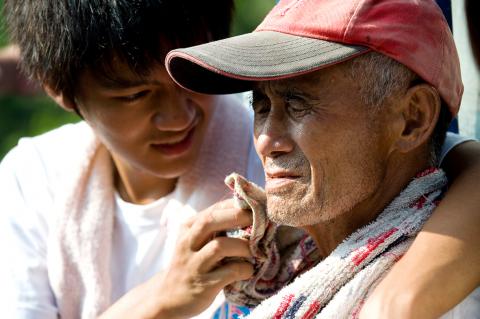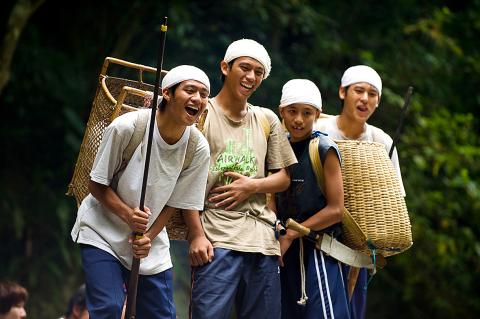For her debut feature Finding Sayun (不一樣的月光), Atayal director Chen Chieh-yao (陳潔瑤) returns to her home village to unearth the legend of Sayun (sometimes spelled Sayion), an Atayal girl who fell to her death in a turbulent stream while carrying a Japanese teacher’s belongings at the end of World War II.
Whereas Wei Te-sheng’s (魏德聖) big-budgeted Seediq Bale (賽德克.巴萊) tackled Aboriginal history in the form of battle epic, Chen (or Laha Mebow in Atayal) takes a completely different approach, examining her Aboriginal roots through personal memories and scenes from everyday life.
The movie begins when the tale of Sayun draws a television crew to the Atayal hamlet of Tyohemg (金岳) in Nanao Township (南澳), Yilan County. Yukan (Tsao Shih-hui, 曹世輝), a high-school boy and a young hunter, does not understand the crew members’ interest in the story. But his grandfather’s (Chang Chin-chen, 張金振) memories of Sayun, whom he went to school with, revives his interest in the old tribal village, which the villagers had been forced to desert 50 years prior.

Photo courtesy of Sky Films Entertainment
The grandfather wants to pay a visit to his childhood home, and Yukan is determined to fulfill the old man’s wish. One day at dawn, together with Yukan’s friend A-guo (Cheng Chia-yeh, 鄭嘉業) and Hsiao-ju (Fang Chih-yu, 方志友) from the crew, they embark on a journey along the treacherous trail to the Atayal home.
Shot entirely in and around the Atayal village and with a cast of mostly nonprofessional, Aboriginal actors, the film is director Chen’s sincere attempt to reconnect with her roots. She delivers a refreshing, lively portrait of Aborigines, who are often depicted as miserable and depressed in films such as Everlasting Moments (靈魂的旅程). Lin Ching-tai (林慶台), who plays Mouna Rudo in Seediq Bale, returns in this movie to his real-life profession (he’s a pastor) and the young Atayal actors give confident performances.
To be honest, Finding Sayun is a debut effort with many flaws. Its storytelling is uneven, and the decision to insert two irrelevant Chinese characters — in order to woo Chinese investors perhaps? — is awkward. Moreover, the film can be fairly confusing to audience members unfamiliar with the legend of Sayun.

Photo courtesy of Sky Films Entertainment
The significance of the story surfaces only if one knows how Japanese colonialists used it for propaganda purposes, the fact that director Chen’s grandmother was Sayun’s classmate and friend, and how the late banker Lin Keh-hsiao (林克孝) kindled public interest in the village when he wrote a book in 2009 about his years investigating the story of Sayun.
Still, Chen knows that there is more than one way to look at history, and uses documentary footage to show how differently the story is remembered by the villagers she interviews. In the end, Finding Sayun is the director’s journey of finding her own way home as she follows the 77-year-old tribal elder Chang to the place where her grandparents were born and the ancestral spirits still dwell.

Photo courtesy of Sky Films Entertainment

That US assistance was a model for Taiwan’s spectacular development success was early recognized by policymakers and analysts. In a report to the US Congress for the fiscal year 1962, former President John F. Kennedy noted Taiwan’s “rapid economic growth,” was “producing a substantial net gain in living.” Kennedy had a stake in Taiwan’s achievements and the US’ official development assistance (ODA) in general: In September 1961, his entreaty to make the 1960s a “decade of development,” and an accompanying proposal for dedicated legislation to this end, had been formalized by congressional passage of the Foreign Assistance Act. Two

Despite the intense sunshine, we were hardly breaking a sweat as we cruised along the flat, dedicated bike lane, well protected from the heat by a canopy of trees. The electric assist on the bikes likely made a difference, too. Far removed from the bustle and noise of the Taichung traffic, we admired the serene rural scenery, making our way over rivers, alongside rice paddies and through pear orchards. Our route for the day covered two bike paths that connect in Fengyuan District (豐原) and are best done together. The Hou-Feng Bike Path (后豐鐵馬道) runs southward from Houli District (后里) while the

March 31 to April 6 On May 13, 1950, National Taiwan University Hospital otolaryngologist Su You-peng (蘇友鵬) was summoned to the director’s office. He thought someone had complained about him practicing the violin at night, but when he entered the room, he knew something was terribly wrong. He saw several burly men who appeared to be government secret agents, and three other resident doctors: internist Hsu Chiang (許強), dermatologist Hu Pao-chen (胡寶珍) and ophthalmologist Hu Hsin-lin (胡鑫麟). They were handcuffed, herded onto two jeeps and taken to the Secrecy Bureau (保密局) for questioning. Su was still in his doctor’s robes at

Mirror mirror on the wall, what’s the fairest Disney live-action remake of them all? Wait, mirror. Hold on a second. Maybe choosing from the likes of Alice in Wonderland (2010), Mulan (2020) and The Lion King (2019) isn’t such a good idea. Mirror, on second thought, what’s on Netflix? Even the most devoted fans would have to acknowledge that these have not been the most illustrious illustrations of Disney magic. At their best (Pete’s Dragon? Cinderella?) they breathe life into old classics that could use a little updating. At their worst, well, blue Will Smith. Given the rapacious rate of remakes in modern